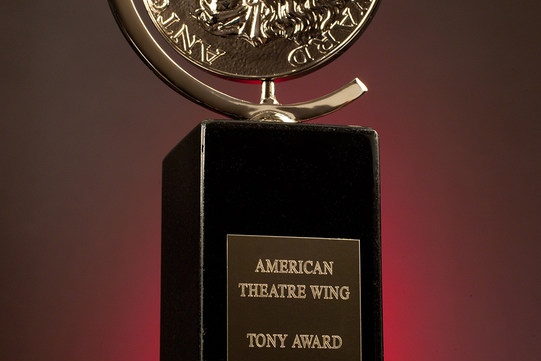
The Tony Awards® Category by Category (2009)
Revised in May 2019
Though they have represented the pinnacle of theatrical excellence since their inception in 1947, the American Theatre Wing's Tony Awards® have fluctuated in number and designation over the years. There are currently 26 categories of competitive Tony Awards. In addition, there are several varieties of special honors that the Tony Awards Administration Committee bestows on deserving individuals and institutions.
Here is a list of current Tony categories with historical perspective on each one.
For a comprehensive database containing the nominees and winners in every category in the history of the Tonys, visit the Tony Archives.
COMPETITIVE AWARDS
Best Play
Award to author; award to producer(s)
There was no Best Play Award in the first year of the Tonys (1947). When the award was introduced the following year, it went to Mister Roberts. Other winners include Death of a Salesman, Long Day's Journey into Night, Who's Afraid of Virginia Woolf?, Fences, The Heidi Chronicles, Lost in Yonkers, and both parts of Angels in America.
Best Musical
Award to producer(s)
Though the Tony Awards were established in 1947, the first Best Musical award didn't come until two years later, when Kiss Me, Kate took home the honor. Since 1971, the award has gone to the producer, with the authors of the musical competing in their own categories (Book of a Musical; Score). Past winners include South Pacific, Guys and Dolls, My Fair Lady, A Chorus Line, Sweeney Todd, Cats, Les Misérables, The Phantom of the Opera, Rent, The Lion King, The Producers, Jersey Boys, and Kinky Boots.
Best Book of a Musical
This award honors the librettist, who is responsible for a musical's spoken dialogue and narrative framework. Originally called "Best Author (Musical)," this award's first winners were Bella and Samuel Spewak for Kiss Me, Kate in 1949. Recent winners include Terrence McNally (Ragtime), Mark O'Donnell and Thomas Meehan (Hairspray), Steven Sater (Spring Awakening), and Trey Parker, Robert Lopez and Matt Stone for The Book of Mormon.
Best Original Score (Music and/or Lyrics) Written for the Theatre
Stephen Sondheim has won this award five times, more times than any other individual. In addition, the only year in which separate Tonys for music and lyrics were awarded, Sondheim won both (for Company, 1971). Other past winners include Cole Porter, Kander & Ebb, Andrew Lloyd Webber, and Lin-Manuel Miranda.
Best Choreography
Ever since Agnes de Mille (Brigadoon) and Michael Kidd (Finian's Rainbow) received Tonys for choreography in 1949, this award has honored outstanding dance on Broadway. Past winners have included Michael Bennett, Bob Fosse, Jerome Robbins, and Susan Stroman.
Best Scenic Design of a Play and Best Scenic Design of a Musical
The Best Scenic Design category was created in 1949. Beginning in 2005, it was split into play and musical awards. Past winners include such masters of stagecraft as Oliver Smith, Jo Mielziner, and Boris Aronson.
Best Costume Design of a Play and Best Costume Design of a Musical
The Best Costume Design award dates to 1947, the first year of the Tonys. For two years, in 1960 and 1961, this category was split into Best Costume Designer (Dramatic) and Best Costume Designer (Musical). It then reverted back to a single category, but in 2005 it was divided once again. Past winners include Cecil Beaton, Florence Klotz, and William Ivey Long.
Best Lighting Design of a Play and Best Lighting Design of a Musical
The Tonys first honored lighting designers in 1970. That year's winner, Jo Mielziner (Child's Play), also picked up the Best Scenic Design award for the same production. Jules Fisher and Tharon Musser are among the artists who have won this award more than once.
Best Sound Design of a Play and Best Sound Design of a Musical were awarded from 2008 through 2014, and revived in 2018.
Best Director of a Play
Before 1960, a single category covered directors of plays and musicals. Past winners for plays include Mike Nichols (five times), Elia Kazan, Jerry Zaks, George C. Wolfe, and Pan MacKinnon.
Best Director of a Musical
Since this category was separated from Best Director of a Play in 1960, its winners have included Harold Prince, George Abbott, Michael Bennett, Tommy Tune, and Julie Taymor. In 2000, Michael Blakemore became the first person ever to win both directing Tonys in a single year, for Copenhagen (play) and Kiss Me, Kate (musical).
Best Performance by a Leading Actor in a Play
Jose Ferrer and Frederic March each won this award in 1947, the first year of the Tony Awards, and again later in their careers. Other repeat winners include Judd Hirsch and James Earl Jones.
Best Performance by a Leading Actress in a Play
Helen Hayes and Ingrid Bergman were the first winners in this category, in 1947. Julie Harris received five Best Actress Tonys, more than any other actress.
Best Performance by a Featured Actor in a Play
This award traditionally goes to an actor whose name appears below the title of the play. Among past winners are Al Pacino (Does a Tiger Wear a Necktie?), Kevin Spacey (Lost in Yonkers), Larry Fishburne (Two Trains Running), Christian Borle (Peter and the Starcatcher) and Courtney B. Vance (Lucky Guy).
Best Performance by a Featured Actress in a Play
This award traditionally goes to an actress whose name appears below the title of the play. Audra McDonald, Christine Baranski, Frances Sternhagen, Judith Light, and Swoozie Kurtz have each won this award twice.
Best Performance by a Leading Actress in a Musical
Angela Lansbury was nominated for this award four times, for Mame, Dear World, Gypsy, and Sweeney Todd. She won each time. Gwen Verdon and Mary Martin each won three Tonys in this category.
Best Performance by a Leading Actor in a Musical
Over the years, three different actors have won this award for their performances as Pseudolus in A Funny Thing Happened on the Way to the Forum. They are Zero Mostel (1963), Phil Silvers (1972), and Nathan Lane (1996). Lane also won this award for The Producers (2001).
Best Performance by a Featured Actor in a Musical
Hinton Battle won this award three times (Sophisticated Ladies, The Tap Dance Kid, and Miss Saigon). Yul Brynner (The King and I) and Joel Grey (Cabaret) each won this award as a featured performer - and later returned to Broadway in the same role, but with his name listed above the title.
Best Performance by a Featured Actress in a Musical
This award was first given out in 1951, when Isabel Bigley won for Guys and Dolls. Other past winners include Gwen Verdon, Lotte Lenya, Barbara Cook, Melba Moore, Nell Carter, Betty Buckley, and Audra McDonald (twice).
Best Orchestrations
This category was established in 1997 to recognize the person or persons who turn the composer's piano music into a full orchestral score. Jonathan Tunick was the first winner, for Titanic.
Best Revival of a Play
Award to producer; award to author in certain cases
Shows have received Tony Awards for revivals since 1977. Depending on the number of revivals in a given season, this category may be combined with Best Revival of a Musical. Recent winners include Long Day's Journey into Night (2003), Private Lives (2002), and Death of a Salesman (1999).
Best Revival of a Musical
Award to producer
The King and I, Cabaret, Fiddler on the Roof, Guys and Dolls, and Kiss Me, Kate are among the shows that received Tony Awards for Best Musical in their original production, as well as a Tony Award for Best Revival (or Best Revival of a Musical) in a subsequent production.
Note: The Tony Award category for Best Special Theatrical Event, which was established in 2001, was retired after the 2009 Tony Awards.
SPECIAL DISCRETIONARY AWARDS
Special Tony Awards
Special awards may be presented to an individual for lifetime contribution to the American theatre, or for other notable achievement.
Tony Honors for Excellence in the Theatre
These honors recognize the achievements of individuals and organizations that do not necessarily fit into any of the competitive categories. They are bestowed at a separate ceremony in the autumn that gives recipients a special moment in the spotlight.
Regional Theatre Tony Award
This award, which was instituted in 1976, honors a regional theatre company that has displayed a continuous level of artistic achievement contributing to the growth of theatre nationally.
Isabelle Stevenson Tony Award
An honor that recognizes an individual from the theatre community who has made a substantial contribution of volunteered time and effort on behalf of one or more humanitarian, social service, or charitable organizations, regardless of whether such organizations relate to the theatre. Established in 2009.





